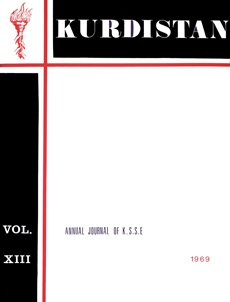|
K.S.S.E. AIMS
"Kurdistan", the official organ of Kurdish Students Society in Europe, (K.S.S.E.), tries to give an idea about the country of Kurdistan and the contemporary situation in which the Kurdish people live. The K.S.S.E. 's constitution states that the Society will endeavour to enlighten the world on the culture of Kurdistan, the condition of the Kurdish people and the question of self-determination; to strengthen the relationship of Kurdish students in Europe and to help to solve their academic problems and facilitate mutual aid between them while in Europe; to strengthen the spirit of co-operation and friendship between Kurdish students and students of other countries, to make contact with students and non-student organizations, both national and international, and co-operate with them in the scope of our mutual aims and interests, to promote the' national Kurdish culture and to work towards the good of the Kurdish people, to contribute towards the struggle of the divided Kurdish people, support all peoples in the struggle against imperialism, racial discrimination and dictatorial regimes, and consolidate with all peaceloving freedom fighters for peace, democracy and liberty. Although "Kurdistan is a student magazine it has a much wider responsibility - the highlighting of the Kurdish society s basic political and economic condition and clarification of the natural and just requirements and demands for a better and fairer way of life. These tasks are inevitable for Kurdish students abroad for a variety of reasons. Firstly, they constitute a major element in the drive towards informing and explaining problems related to Kurds and Kurdistan to the outside world. Secondly, there are better opportunities in Europe to express freely what Kurdish individuals think about general issues than elsewhere, particularly in the Kurdish peoples' own country (divided Kurdistan). Therefore it is necessary for Kurdish students abroad to recognize these responsibilities. They can do this first of all by achieving educationally what they have set out to achieve by acquiring new knowledge - scientific, technical, or otherwise, but at the same time they must recognize their other responsibilities whilst staying abroad, and naturally when they complete their studies Through K.S.S.E., individual Kurdish students can realize their duties to a very large extent as practice has shown us. This has been borne out by the remarkable success of the Society's activities since it was founded in 1956. Membership of the Society has grown from a mere 17 members to hundreds. The society, furthermore, has gained international recognition by becoming a member of the International Union of Students (I.U.S.) in 1964.
Finally the primary aim of K.S.S.E. should be to encourage its members to assist the people of Kurdistan 'after completing their training and education. This can be realized by undertaking the various tasks involved in running a Kurdish autonomous administration in Kurdistan-Iraq. The economic and human needs are vast. There is a great shortage of teachers and doctors in Kurdistan especially in the liberated area. We hope "Kurdistan" will be of service in this task.
General Executive Committee
EDITORIAL
Kurdistan Politics in Perspective
The condition of the Kurds in Iran and Turkey remains as it has been for the last decade. There have been a few indications, at least superficially, that the Kurdish problem is being treated seriously and perhaps more realistically. For example, the words "Kurds" and "Kurdistan" are no longer taboo in the Turkish press. But this in itself does not constitute any real progress towards recognizing the national human rights of the Kurds. In fact these minor changes have been generated by the effect of events in Kurdistan-Iraq. In Iran the Kurds are still deprived of basic national rights such as education in their own language, the right to enjoy and promote their cultural heritage and other natural rights, whilst in Turkey in addition to the absence of any national rights for the Kurdish people the Turkish Government still maintains a racialist stand against them by not recognizing in any form the distinct national entity of the Kurdish people. As for the Kurds in Syria, they have been subject, like those of their brothers in Kurdistan-Iraq, to a vicious policy of Arabisation by the fanatical Baathists. The situation has reached the point where an important Minister in the Government, Mohammed Talab Hilal, advocates in a widely-published book the adoption of a Hitlerian policy of shifting and dispersing Kurdish native population from Kurdish areas, so that the Kurdish community as such has no recognized entity. In fact the government has already started implementing this policy which is known as the "Arab Belt Plan".
The major political interest at the moment surrounds political events in Kurdistan-Iraq, where the resistance movement has been consolidating in order to achieve a viable autonomy since September 1961.
The success of this revolutionary movement has attracted a great deal of attention in the Middle East and internationally. One can definitely state that the Kurdish problem has become a major element in the regional and international conflicts of the latter half of the twentieth century. It is gradually becoming obvious that permanent stability in the Middle East area depends partly on a just and satifactory settlement of the Kurdish issue. This can be achieved ... | 